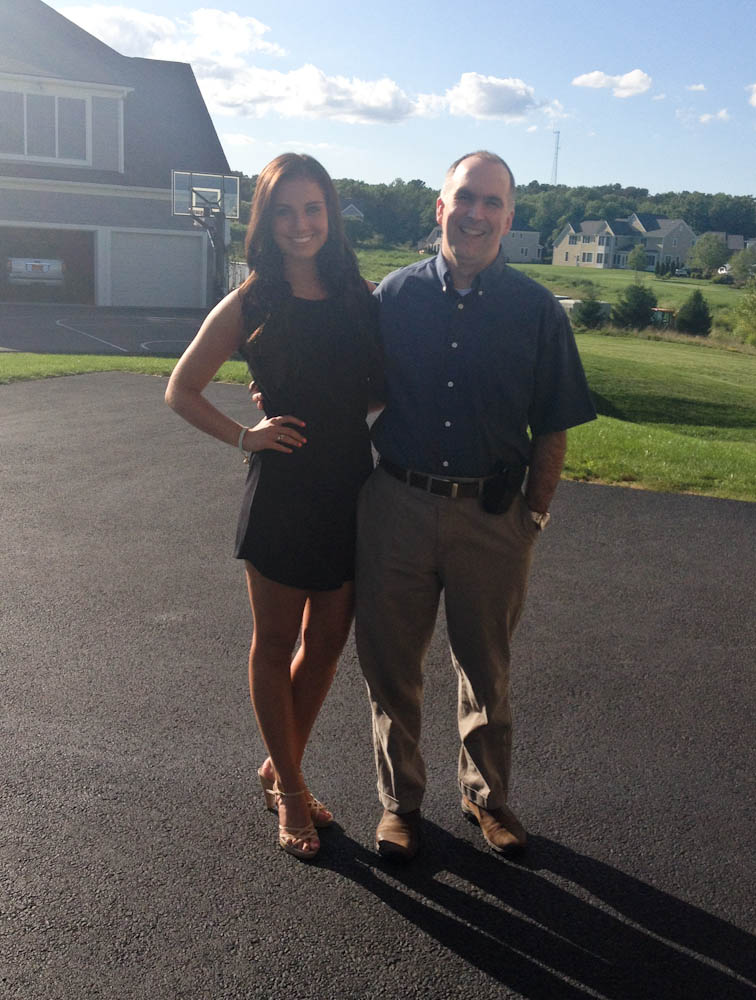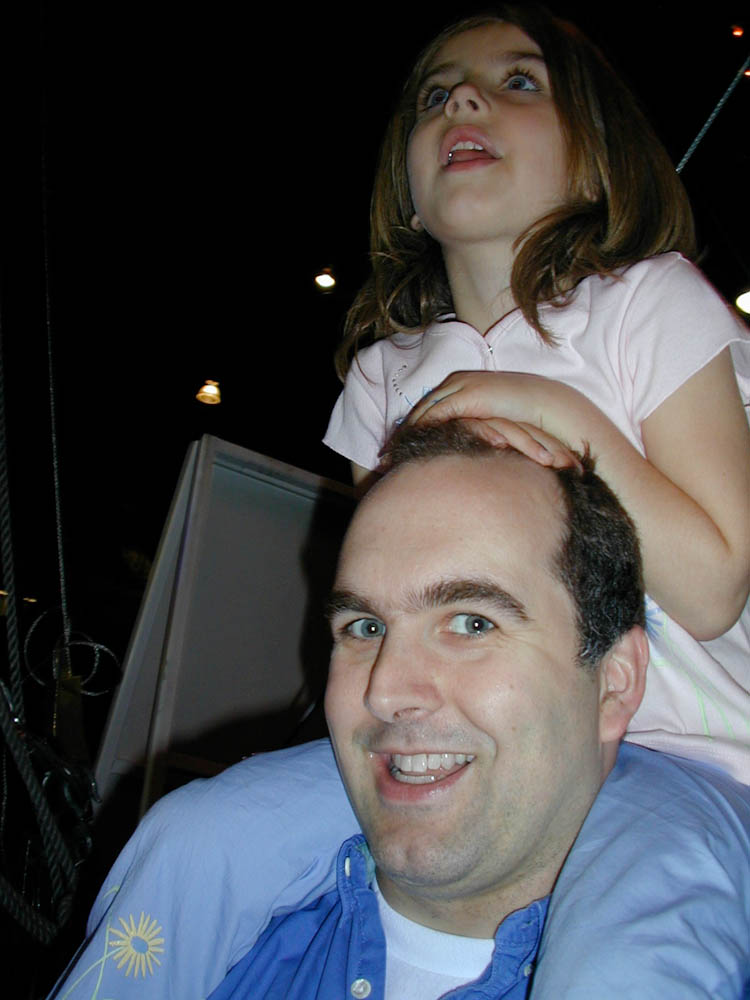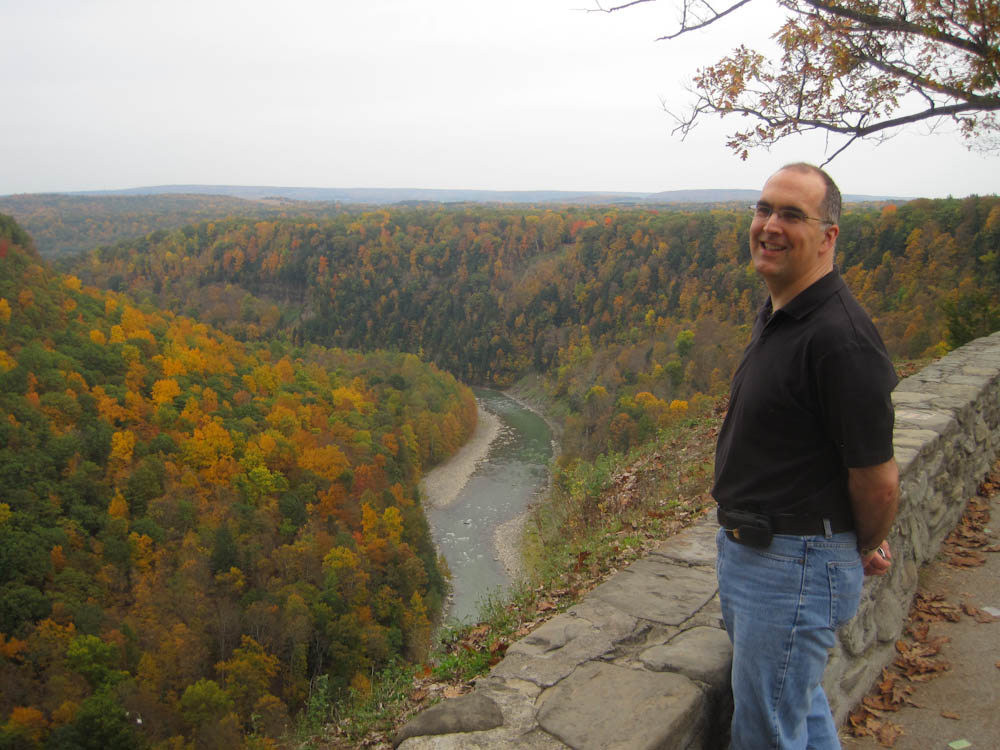By Elise Renner
There’s a 1-in-12 chance that this is the month yours or your loved one’s cancer is recognized—odds better than the survival rates for some of these diseases. Some months, like October, boast big names like breast cancer. Others, like September, are crowded with lesser-known branches of the disease. “Cancer apparel,” including ribbons and jewelry, is marketed with pretty colors, one for each type of cancer, and sold to raise money as well as awareness. For my dad, I would wear maroon. Multiple myeloma, maroon, March – whoever decided this must’ve been keen on alliteration. This month I am hyper-aware of the disease that took my dad’s life last year, but it isn’t because of a ribbon or cancer calendar.

As the first anniversary of his passing approaches, I find myself in constant reflection. The three-year battle we fought against this disease certainly felt like war for me, my mom, and especially my dad, who stood alone on the front lines. This month marks the day he found peace, but I, and the countless others who have enlisted against cancer, are forever dedicated to the fight. This is why awareness months exist; as trivial as it may seem to assign a color or a catchphrase to cancer, it’s another war tactic. The International Myeloma Foundation has implemented its “Tell One Person” campaign to increase awareness of this lesser-known disease, and hopefully by sharing my story I can arm you with one of the most powerful weapons we have: information.
The beginning
We had just recently moved from Virginia Beach, where we spent our days catching waves and riding bikes along the pier, to the colder climes of upstate New York. Even during the bitter winters, my dad still found ways to be active. He always made time for his favorite exercises during the week, and kept his weekends just as lively, planning fun outings with me and my mom to different museums, amusement parks, and restaurants.
In 2011, the three of us took a trip to Europe. My dad had to go for work-related reasons, but in his mind, the business of family fun came first. He was a rare “type A” personality who also knew how to have fun; he mapped our trip down to the double-decker bus routes, while allotting time for spontaneous exploring off the beaten path.
The day we were scheduled to leave, my parents received a call from my dad’s doctor, whom he had recently seen after noticing unusual, fleeting pulses of pain in his bones. Just hours before embarking on our journey, my dad found out there was an unknown infiltration in every single bone shown in his scan. I think he somehow knew this would be the last chance we would get to make this trip. Staying true to his logical, adventurous spirit, he confirmed with the doctor that nothing could be done right away, and wore a smile on his face as we left for the airport. If he was hurting then, emotionally or physically, he didn’t show it.

My mom, dad, and I were ambitious explorers, and we were excited to make new memories in Europe. But just three days after unpacking our bags, instead of exploring old world treasures, we were repacking and heading home. Struck by shooting pain that coursed the length of his back and neck, my dad had been unable to leave his hotel bed. Forced to face the grim news, we braced ourselves for the impending diagnosis: My dad had aggressive multiple myeloma.
The middle
It was a constant cycle of progression and regression as my dad found his “new normal.” He traded bike rides for back braces, Pilates classes for platelet packs, and mountainous hikes for monotonous trips to the hospital. He underwent two unsuccessful stem cell transplants, one autologous and one allogeneic, countless blood transfusions, chemotherapy, and radiation. The harsh drugs may have thinned his bones and hair, but he kept his mind sharp by making Excel spread sheets of his tumor markers, called Kappa Free Light chains. We watched the number oscillate as his disease progressed. Essentially, it indicated the amount of tumor in his bones – the lower the number, the fewer cancer cells. Sometimes it would be explosive in the high hundreds and sometimes it would waver in the single-digits, but we always held out hope for a lower number.

Inside the stark white hospital halls, my parents would find ways to laugh and enjoy their time together. They played card games, watched old movies, and reminisced. In preparation for his long hours in the MRI suite, my dad would study maps of Disney World and spend his time mentally touring the amusement park as the machine beeped around him. My mom kept meticulous track of the medicines he took, mastering the art of pinpointing which drugs caused the nastiest side effects, which kept him awake, and which courses of treatment would require a full-time caregiver. My mom was always this caregiver, and she devoted so much of herself to his fight, providing necessary comfort and care in a way no one else could. She was my dad’s advocate, his companion on long days in the hospital, and a super-woman for being there for him and still finding time for me.
Even though my dad is no longer with us, this story doesn’t have an end. Sometimes the conversations are hard, but as time goes on, I’m learning how valuable it is to share my family’s experience. My parents always kept me informed through my dad’s battle; I didn’t feel like they were keeping secrets or sparing me painful details, and that meant the world to me. But even after getting all of the available information, it still feels like there are pieces missing: Why did this happen? How could we have prevented it? It’s vital to spread awareness, because you never know who may be able to fill in some more of the puzzle. If you’ve experienced multiple myeloma, skip the maroon t-shirt this month, because by telling just one person you’ve done your part in the fight against this disease.

Elise – Thank you for sharing your story with us. I am so sorry to hear of the loss of your dad. He sounds like an amazing man. I lost my baby brother to leukemia 17 years ago, and my family is now dealing with my dad’s prostate cancer. You are an amazing young woman. Your dad would be so proud of you. Stay strong and keep fighting the fight. I stand beside you and all the others here and everywhere to fight this dreaded disease – Cancer. It will not beat us. God bless.
I can relate to your experience. Our family lost our mother on July 6, 2004. She endured multiple myeloma and the associated pain with incomprehensible strength and determination. She was a very busy lady, filled with life and laughter, and the changes brought on by this disease were powerful and absolute. In 2004 we vaguely knew of the disease, likely only because it had been reported in the news that some well known person was battling it; however, today it seems that more people are aware of this condition and its effects. While I can still see her smile and sparkling eyes in myself and on the faces of my children, we all miss her every day, and hope for a cure to this terrible cancer.
Thank you Elise for your heartfelt story……I am sorry your family had to endure this awful disease. My husband is into his 7th year battling MM, he has had 2 stem cell transplants which only lasted 15months each – his is currently on a clinical trial at DFCI and rcvd bads news last week that his cancer is progressing even through treatment – not a very good sign…..my question is how old were you when your Dad was diagnosed – you said you were thankful that they didn’t try to hide anything…..I have 2 children 14 and 11, they know pretty much everything, but have no clue of the severity he now faces, I worry enough for all of us, I don’t want them to worry too, not sure how much to tell them.
Hello Elise, Thank you for sharing you and your Dad’s story. The picture of you on your Dad’s shoulders remind me of my 10 year old daughter Riley and I. I was diagnosed with Multiple Myeloma in the spring of 2010, underwent a stem cell transplant in December of 2010, I continue to take maintenance chemotherapy and I remain in remission. I appreciate you sharing insight to your side of the story as I worry about my Riley. She has taken my disease in stride, she does well in school, has good friends and enjoys her after school activities. I’m the Dad that always carried my children on my shoulders or in my arms. Today I kneel for a hug or pick them up for a quick squeeze. Thank you again for sharing and helping with creating awareness for Multiple Myeloma patients.
Thank you for sharing your family’s story. I lost my Dad to MM in November 2013. He was 67 years old. It was about 7 years from the first unexplainable pain in his feet until he succumbed, having been through multiple rounds of chemo and 2 stem cell transplants in the process. He was excited about being accepted into a clinical trial at Dana Farber after his 2nd transplant, but he never recovered fully enough to be a viable candidate. I miss him every day. I will be running my second Boston Marathon on April 20 in his memory and to keep spreading the word about this awful disease.
Hi Jeanne, Elise here. I was 13 when my dad was diagnosed and 16 when he passed away (last year). I think my mom was in a similar position as you, feeling unsure about the future and seeing some bad signs. I know it must’ve been hard for her to keep me in the loop when she, as well as the doctors, were so unsure. At times, amidst the little victories and hopeful news, her worries and fears would come out sporadically. Sometimes I felt like I had to read into these little clues, and make guesses on how bad it really was. When my mom would sigh, and her eyes would be red and puffy, I knew the reality was worse than what she was telling me.Although I felt like I was in the loop, all of the information I received was always followed up by something optimistic. Therefor, I didn’t really realize he was dying until it was actually happening right in front of me. Looking back on it, I’m conflicted. On one hand, I feel like my optimism was almost foolish, but on the other hand, I don’t think my mom or I should have been anything but optimistic. My advice to you would be to not keep your children guessing, but also to not let them lose hope for a single second. Easier said than done…but I hope this helps. Good luck and best wishes to you and your family.
Hello,
Thanks for sharing. Reading this today reminds me of why the rest of us should live for today because life is short and things happen unexpectedly. Dr. Anderson at DFCI is the premiere MM specialist and I hear about this annually because I am a platelet donor and he always comes to our brunch and let’s us know MM care is improving. Unfortunately, for you and others we aren’t there yet.
U brought tears to my eyes. I lost my father to multiple myleoma on Feb 11, 2011. He was a happy free going person and we discovered the cancer only in the last stage. He didn’t last 4 months.
He didn’t have to suffer long. In India (where I’m from) treatment wasn’t the best either but they were trying to stop the cancer and failed. 4 years late, I still struggle to cope with him not being around. Thank you for the blog entry. God bless you and give you strength
Dear Elise,I had heard a bit about your father’s experience with myeloma because your father’s brother attends the same Friends Meeting as I do. I was interested because I was diagnosed with MM in September 2012. One thing that your account brings home is that I was not wrong to do things like immediately update my will, financial plan, etc. and cancel some commitments when I got the diagnosis. At that time, I had no way of knowing whether I would have an aggressive disease like your father’s, or a less aggressive one, as I seem to have. Right now my disease is at a pretty low level, and I am doing well, but the odds are that at some point it will progress. You ask: ”Why did this happen?” and ”How could we have prevented it?” I think that at this stage of scientific knowledge, MM cannot be prevented and we don’t have much idea of factors that tend to trigger it. It seems like your father was actually diagnosed relatively early, so the problem was not a delayed diagnosis. He just had the bad luck that the genetics of his disease were aggressive, and often there is not much that can be done to stop it. Some people live an even shorter time than your father did. I am glad you are taking a positive attitude and thinking about ways to help others. In the not too distant future, there are very good prospects that this disease can be managed for most patients, and that at least some can be cured. It is a matter of research funding, the dedicated work of researchers, and the willingness of patients to sign up for clinical trials. A lot of people (at Dana Farber for example) are working on this. Foundations like MMRF, IMF, and Crowdcare have been set up to raise funds for research. And NIH can use more funds to work on this.
I am from India and I lost my dad two weeks ago. He had this same horrible disease but he fought and fougth it bravely for six long years. My heart goes out to everyone who is fighting this disease or their loved one has this..Cancer does not affect the individual but the whole family. I can’t count how many times my dad had to go to hospital and we stood by him . I miss my dad a lot and pray we get the cure as soon as possible
Dear Amit —
We are so sorry to hear about the loss of your father. Sending our thoughts to you and your family during this difficult time.